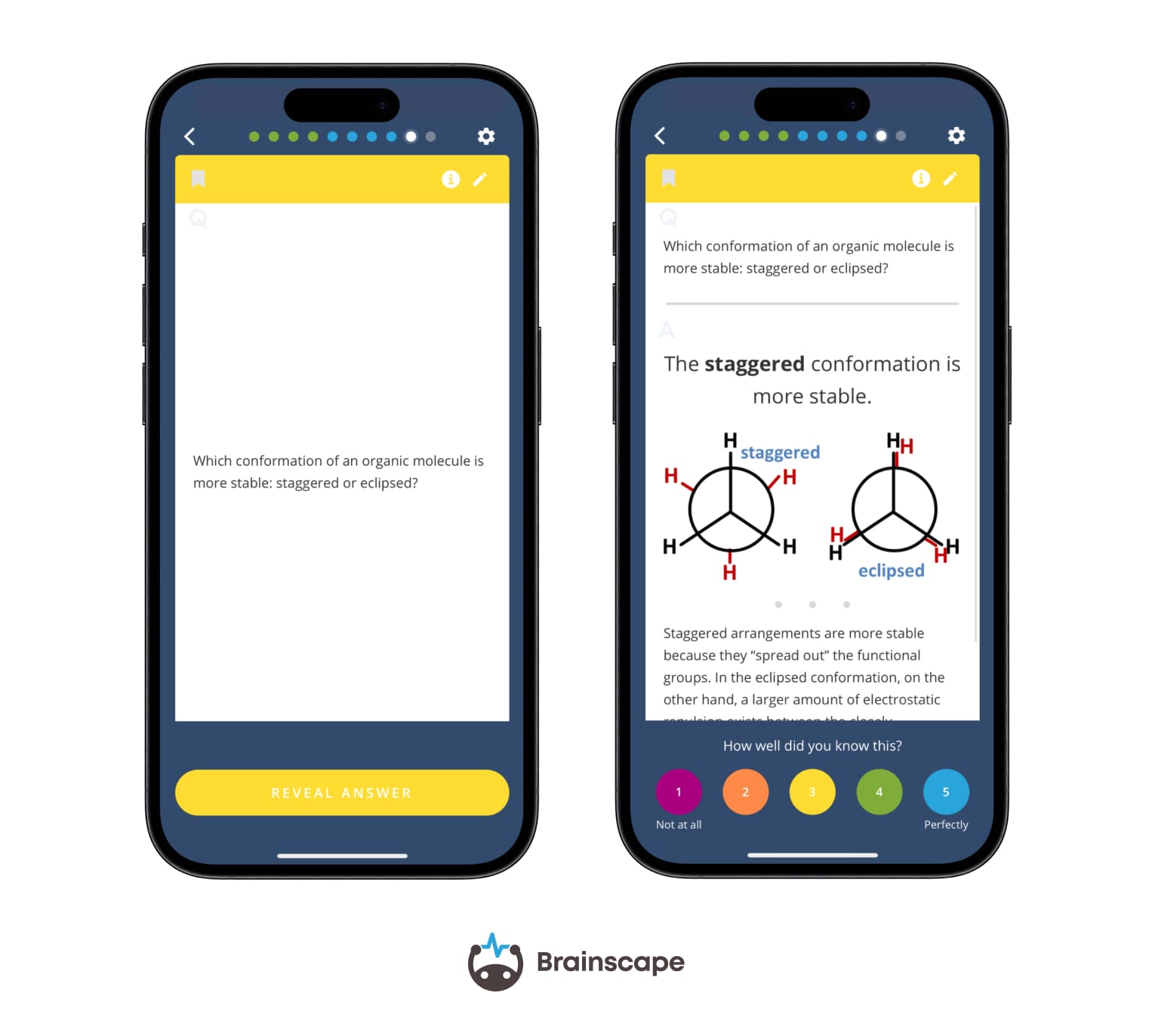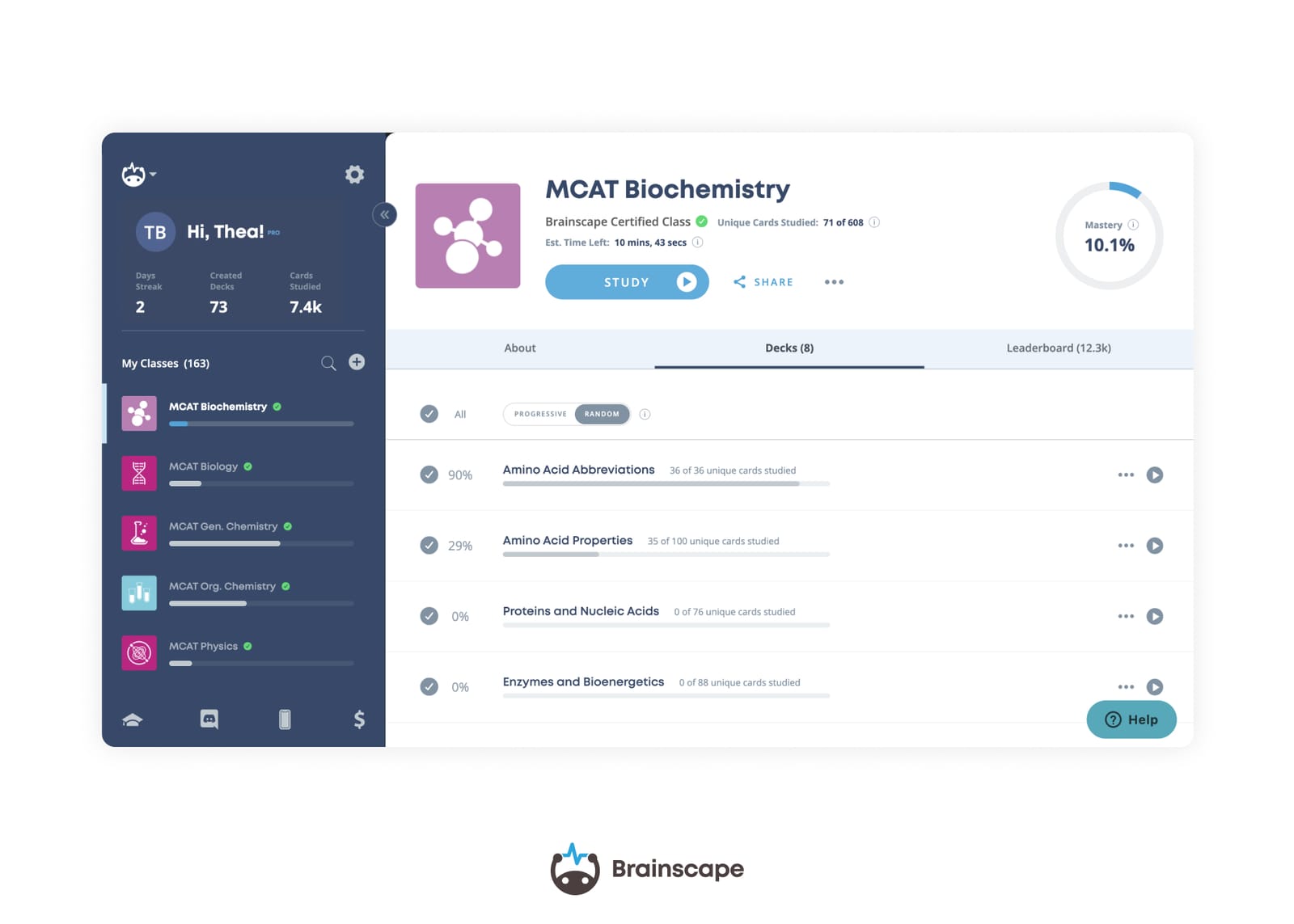What do marriage, appendectomies, and preparing for the Medical College Admissions Test (MCAT) have in common?
You only do them once. (Or at least that’s the plan.)
And because you expect to do them only once, it can feel overwhelmingly disappointing and frustrating when something goes wrong and you have to start over. I mean, can you imagine your surgeon saying: “Yeah, so…when we did your emergency appendectomy, we missed a little bit. Sorry about that. Come back again in a couple of months when you’ve healed up, and we’ll try again.”
No thanks.
The same applies to MCAT test prep, or studying for any major exam really. There is nothing quite so confusing and disappointing as studying a topic—Woohoo! Success! Tick it off the list!—only to encounter that content in an MCAT practice question or test weeks later and get it wrong.
You put in the work, but your brain seems to be on a beach in Bermuda, sipping on cosmopolitans.
Listen: this happens all the time in MCAT test prep, and it’s not necessarily a setback. The important thing is not to stress, but rather to approach your mistake with curiosity so that you can forever bridge it and never repeat it.
To help you do just this, the team here at Brainscape turned to our resident MCAT expert, Clara Gillan, who scored a whopping 526 on the exam, placing her in the top 100th percentile of all students who’ve taken the exam, like, ever.
From this stratospheric score, Clara unsurprisingly became the Director of Product at MedSchoolCoach, which provides pre-med and medical school admissions consulting services.
In other words, she knows exactly how to do well on the MCAT. In this guide, Clara will help you understand:
- All the reasons you could be getting questions wrong—many of which have nothing to do with your MCAT science knowledge (so relax).
- What you can do to learn from your mistakes so that you never repeat them.
- One of the most effective study tools for ingraining the huge amount of information required to ace the exam: digital flashcards.
Armed with all of this, you’ll be well on your way to medical school!
Let’s get started!
Is It You Or Is It The MCAT Test Prep Questions?
Here’s the scenario: you’re well into your MCAT practice, and you’re particularly confident in, for example, your amino acids and basic carbohydrate structure. You’ve practiced many questions and moved on to the next topics.
Now, weeks later, you’re attempting an MCAT question of the day or a practice test, and would you believe it, you’re getting questions about those topics wrong! You’re supposed to know this stuff! What’s going wrong?
First of all: Don’t panic.
Getting MCAT practice questions wrong isn’t always indicative of a gap in your content knowledge or problems in your content review process. Sure, these are possibilities, and you must rule them out. But other explanations are worth thinking about, which will help you to keep a level head.
Here they are:
- Some MCAT test prep questions are really hard
- You got thrown off your game by a pseudo-discrete MCAT question
- The answer lies in the passage, but you missed it
- You ran out of time
- You DO have a gap in your MCAT content knowledge
Now, here’s how to do well on the MCAT … the first time!
Are Some MCAT Test Prep Questions Really Hard?
On a typical full-length MCAT practice test, at least a handful of questions are noticeably harder than the rest. That’s just how the MCAT cookie crumbles, and it goes both ways: you’ll likely see some absurdly easy questions, too.
So, it could be that the one amino acid question you got wrong was the hardest question in the entire section. When that happens, it can make you feel insecure about the MCAT content you thought you knew well.
What Should You Do?
Check to see if the practice questions you completed have difficulty ratings assigned to them, and if so, whether the question you got wrong was rated hard, easy, or somewhere in between. If it was a hard question, well, then that’s probably why you got it wrong.
If the practice MCAT test doesn’t provide question difficulty, you can take it to a fellow student, tutor, or professor to get their opinion. If they thought the question was unremarkable or even easy, that’s a red flag, and you should probably take a moment to assess your knowledge of that topic; perhaps dedicate an hour or two to reviewing it.
In both of these cases, treat incorrect test answers as a valuable opportunity to learn and hone your intellectual arsenal against the real MCAT test. Take note of any critical flaws in your reasoning or content knowledge. Make sure you understand why you got the question wrong, and even create a flashcard so that you can review it repeatedly until you never get it wrong.

Did You Get Thrown Off Your Game By Pseudo-Discrete MCAT Practice Questions?
The second possible explanation for getting an MCAT practice test question wrong is that it looks like it’s associated with the passage, but is actually ONLY testing your content knowledge. This is called a pseudo-discrete question (which you’re probably familiar with if you’ve taken a full-length MCAT practice test).
These kinds of questions are surprisingly common! And you know you’ve got one when you spend an inordinate amount of time scouring the passage, trying to figure out the answer when you need to look no further than your own noggin. The question sounds like it’s based on the passage, but in fact, it’s 100% testing your content knowledge. You might have that content knowledge nailed down, but it didn’t do you any good because you didn’t know that you needed to access it.
If you recognize a pseudo-discrete question early on, you can save yourself a lot of time and confusion when trying to answer it. This is a significant key to how to do well on the MCAT, and you can only attain it through practice, practice, practice!
The Answer Lies In The Passage, But Did You Miss It?
Another example of how candidates can become confused is when MCAT test prep questions ask about information that’s outside the scope of what you need to know. This can make you feel like you’ve missed something in your studies when, in reality, you are supposed to get the answer straight from the passage.
So, it’s like the opposite of a pseudo-discrete question (but there isn’t a cute word for it). And these questions are all over the MCAT.
Say an MCAT question asks about the bonds in isomaltose, a disaccharide. PANIC! Isomaltose is not a molecule you’re familiar with. Did you miss something? Was your brain on vacation again? (Perhaps in the Maldives, this time?)
No, no. Relax. You don’t need to know anything about isomaltose, but that doesn’t mean a question won’t be asked about it. Maybe the passage shows the structure of isomaltose directly, or maybe it gives just enough information for you to be able to deduce that isomaltose is similar to maltose but contains an alpha 1-6 instead of an alpha 1-4 bond.
The answer lies within the passage. You just need to go mining for it.
So, before you start kicking yourself for being forgetful, make absolutely sure you understand whether to turn to your content knowledge OR the passage (or both) for an answer.
Did You Run Out Of Time To Answer All The MCAT Test Questions?

A rather unfortunate, yet common reason why people miss points on the MCAT test is that they run out of time.
This is where taking many MCAT practice exams comes in handy. If you find yourself struggling to get through everything in the allotted time, then it’s your time management skills or even test-taking strategies that could use improvement.
Do You Have A Gap In Your MCAT Content Knowledge?
Finally, the reason you might have gotten an MCAT test prep question wrong is that there is an actual problem with your understanding of the content.
Perhaps you knew the content before, but you’ve since forgotten. This is a very real and very common scenario because there is so much information to cover. Balancing the learning of new content with the review of older content is an ongoing challenge for MCAT candidates.
Alternatively, maybe you never fully understood the content because you studied it superficially, and you didn’t realize this before because questions on that area never came up. Or they did come up, but you were able to blunder through them. This blundering is an incredibly easy mistake to make because it’s surprisingly easy to get questions right for the wrong reasons.
For example, you probably know that sound travels fastest in solids and slowest in gases. That fact alone can answer most questions about the concept. But you can know this fact and still have a completely mistaken idea about why it is the case.
Namely, students often think that the velocity of sound is directly correlated with the density of the medium. We won’t get too far into this here, but it’s actually the opposite of the truth; the speed of sound is inversely correlated with density and directly correlated with the bulk modulus of the medium. The faster velocity of sound in solids is due to their massively higher bulk moduli, not their higher densities.
Whether you forgot certain content or never learned it right in the first place, you should go back over the topic, making sure to avoid straying too far outside facts you see in your MCAT test prep resources.
Throughout this review, constantly ask yourself questions, like: “Why does it work this way?” and “Does this fit in with what I know about related topics?” This will prevent you from studying superficially again, and it’ll help you retain memorized information better, too. Then, work through some practice questions if available.
As a quick side note, students often work through discrete questions (including MCAT questions of the day), not passages, as part of this content review process. This is fine; it’s a great way to test understanding! But if you get every discrete question right but later miss passage-based questions on that topic, again, it’s probably your passage analysis that actually needs work.
How Can You Use Digital Flashcards To Master The Facts?

There is a secret weapon to help you overcome all of the hurdles we’ve discussed in this guide … an MCAT test prep tool that automates the daily review of content, making it so convenient and easy that all you have to do is pick up your phone, tablet, or laptop, open an app, and start running through MCAT flashcards.
Throughout the course of your MCAT preparation, your content review will never truly be “finished.” You’re bound to forget some topics over time, and even if you study with constant self-questioning and critical thinking, you may misunderstand others and only realize this later.
Digital flashcard apps like Brainscape or RemNote are a powerful, effective, and convenient way to combat this degradation over time. Research has shown that these tools improve MCAT scores because they build on three powerful learning methods: active recall, spaced repetition, and metacognition
Active recall is the practice of forcing yourself to pull an answer directly from memory, rather than recognizing it on a page of notes or a multiple-choice list. It works because recalling information strengthens the neural pathways that store it, much like exercising a muscle makes it stronger. Even if you get a card wrong, the mental effort of trying, followed by immediate feedback, makes the next attempt more successful. Over time, this approach is far more effective than passive study methods like rereading or highlighting, which can create a false sense of progress.
Spaced repetition is equally important. Instead of cramming, you revisit information at intervals that gradually lengthen each time you remember it correctly. This strategy takes advantage of the way memory works: just before you’re about to forget something, reviewing it again reinforces the knowledge and pushes it deeper into long-term storage. By repeating this cycle across hundreds of facts, you build lasting retention without wasting time on material you already know well.
Modern flashcard apps like Anki or Brainscape use adaptive algorithms to schedule these reviews for you, so you don’t have to track them manually. Studies with medical students show that this method not only accelerates learning but also lowers stress and anxiety, since you can clearly see your progress and know you’re focusing on what matters most.

Finally, metacognition is the skill of stepping back and reflecting on your own learning. It's the skill you practice when assessing your knowledge of each flashcard, and it improves your memory. Even discovering that you didn't know something as well as you thought you did is proven to reinforce the fact in your memory.
By combining these three techniques and automating your study process, digital flashcard apps provide the most efficient method for mastering all the facts you need to conquer the MCAT.
How Can You Turn MCAT Test Prep Mistakes Into Learning Opportunities?
There are all kinds of reasons you might fumble with MCAT practice questions or the actual test, only one of which comes down to you not knowing the content well enough or having forgotten it. And for that, there’s Brainscape to keep your knowledge fresh, alive, and vital, which is how to do well on the MCAT.
The best approach to do well on the MCAT the first time is to take on (and learning from) practice questions, whether an MCAT question of the day or a full-length practice exam. You need to see every missed question as an opportunity to re-evaluate your weaknesses. And hopefully, the strategies we’ve talked about will help you do exactly that.
Additional Reading
- How To Study For The MCAT More Efficiently
- 8 Common MCAT Myths (That Could Be Derailing Your Studying)
- The Ultimate 3 Month MCAT Study Plan
References
Butterfield, B., & Metcalfe, J (2006). The correction of errors committed with high confidence. Metacognition and Learning, 1(1), 69-84.
Cole, R., McHugh, D., & Netter, F. H. (2017). Assessing emotional stress, active recall and digital spaced‐learning media in the Study of Thoracic Gross Anatomy by Medical Students. The FASEB Journal, 31(S1). https://doi.org/10.1096/fasebj.31.1_supplement.580.7
Deng, F., Gluckstein, J. A., & Larsen, D. P. (2015). Student-directed retrieval practice is a predictor of medical licensing examination performance. Perspectives on Medical Education, 4(6), 308–313. https://doi.org/10.1007/s40037-015-0220-x
Karpicke, J. D. (2012). Retrieval-based learning: Active retrieval promotes meaningful learning. Current Directions in Psychological Science, 21(3), 157-163.
Kang, S. H. (2016). Spaced repetition promotes efficient and effective learning. Policy Insights from the Behavioral and Brain Sciences, 3(1), 12–19. https://doi.org/10.1177/2372732215624708
Kerfoot, B. P. (2010). Adaptive spaced education improves learning efficiency: A randomized controlled trial. Journal of Urology, 183(2), 678–681. https://doi.org/10.1016/j.juro.2009.10.005
Kornell, N., Hays, M. J., & Bjork, R. A. (2009). Unsuccessful retrieval attempts enhance subsequent learning. Journal of Experimental Psychology: Learning, Memory, and Cognition, 35(4), 989–998. https://doi.org/10.1037/a0015729
